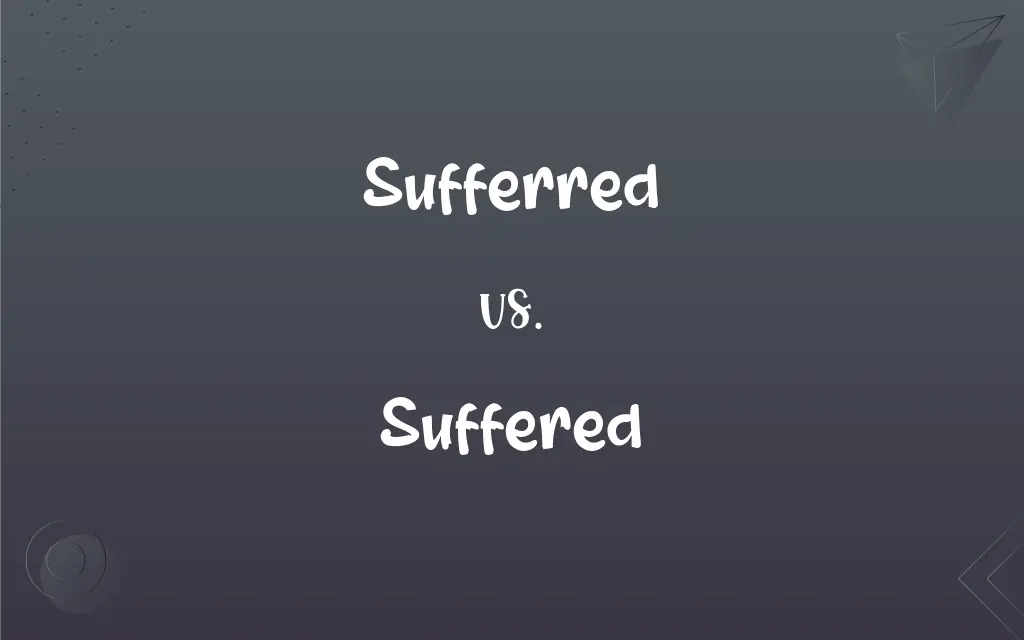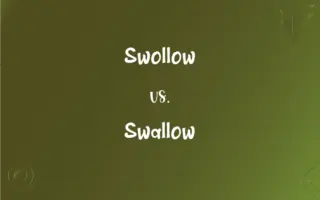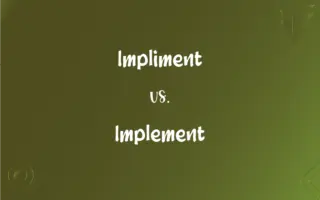Sufferred vs. Suffered: Mastering the Correct Spelling
Edited by Aimie Carlson || By Janet White || Updated on March 8, 2024
"Sufferred" is incorrect, whereas "suffered" is the correct spelling. "Suffered" means to experience or be subjected to something bad or unpleasant.

Which is correct: Sufferred or Suffered
How to spell Suffered?

Sufferred is Incorrect

Suffered is Correct
ADVERTISEMENT
Key Differences
Break it down phonetically as "suf-fered"; you don’t hear an extra 'r' sound.
Remember, "suffer" has only one 'r', so its past tense, "suffered", should too.
Think of "suffered" as "suffer" + "ed"; there's no extra 'r' in "suffer," so none should be added.
The word "suffered" mirrors the construction of other regular past tense verbs like "needed" or "wanted" – only one doubled letter.
Use mnemonic i.e. "Single 'r' for past regrets" to recall that "suffered" has only one 'r'.
ADVERTISEMENT
Correct usage of Suffered
He sufferred from a cold last week.
He suffered from a cold last week.
The country has sufferred a great loss.
The country has suffered a great loss.
They were sufferred to enter the restricted area.
They were suffered to enter the restricted area.
I have never sufferred such humiliation before.
I have never suffered such humiliation before.
She has sufferred enough for her mistakes.
She has suffered enough for her mistakes.
Suffered Definitions
Endured or tolerated.
They suffered through the long and tiring journey.
Experienced pain or distress.
He suffered immense pain after the accident.
Underwent a negative experience.
She suffered a loss in her business.
Was affected adversely.
The crops suffered due to lack of rain.
Faced punishment or unpleasant consequences.
The criminal suffered a lengthy prison sentence.
To feel pain or distress; sustain injury or harm
Suffer from arthritis.
Made the people suffer for their disloyalty.
To have a specified shortcoming or weakness
Writing that suffers from poor organization.
Suffered Sentences
She suffered the consequences of her actions.
The patient suffered from a rare disease.
The team suffered a defeat in the final game.
They suffered a setback in their plans.
The soldiers suffered in the harsh weather conditions.
She has suffered enough; let's not be harsh on her.
The athlete suffered an injury during the match.
After the accident, he suffered a lot of pain.
The community suffered from a lack of resources.
He suffered a loss in his family.
Many people suffered during the economic downturn.
The business suffered a significant financial loss.
She suffered from the cold in the winter without proper heating.
The environment has suffered due to pollution.
She suffered a personal tragedy but remained strong.
The city suffered heavy damage from the storm.
The family suffered the loss of their home in the fire.
He suffered from insomnia for months.
The students suffered from anxiety during exams.
The farmer suffered a poor harvest due to the drought.
They suffered in silence, not wanting to burden others.
He suffered from a misunderstanding with his friend.
The artist suffered for his art, often going without food.
FAQs
What is the root word of suffered?
The root word of "suffered" is "suffer."
Which vowel is used before suffered?
The vowel "u" is used before the 'r' in "suffered."
Why is it called suffered?
It is called "suffered" because it is the past tense of "suffer," indicating experiencing pain or distress in the past.
What is the verb form of suffered?
"Suffered" is the past tense and past participle form of the verb "suffer."
What is the pronunciation of suffered?
"Suffered" is pronounced as /ˈsʌfərd/.
Which conjunction is used with suffered?
Conjunctions like "and" or "but" can be used with "suffered."
What is the singular form of suffered?
The singular form is "suffered," as it is a verb and does not change in number.
Which preposition is used with suffered?
Common prepositions used with "suffered" include "from" and "under."
Is suffered an adverb?
No, "suffered" is not an adverb.
What is the plural form of suffered?
As a verb, "suffered" doesn't have a plural form; it remains "suffered" for both singular and plural subjects.
What part of speech is suffered?
"Suffered" is a verb.
Is suffered a vowel or consonant?
"Suffered" is a word composed of both vowels and consonants.
Is suffered a collective noun?
No, "suffered" is not a collective noun.
How many syllables are in suffered?
There are two syllables in "suffered."
Is suffered a noun or adjective?
"Suffered" is a verb, not a noun or adjective.
Is the suffered term a metaphor?
"Suffered" itself is not a metaphor, but it can be used metaphorically in a sentence.
What is the first form of suffered?
The first form is "suffer."
How do we divide suffered into syllables?
"Suffered" is divided as suf-fered.
What is a stressed syllable in suffered?
The first syllable "suf-" is the stressed syllable in "suffered."
What is another term for suffered?
Another term for "suffered" could be "endured" or "experienced hardship."
What is the third form of suffered?
The third form is also "suffered."
Which determiner is used with suffered?
Determiners are not typically used directly with "suffered" as it is a verb.
What is the second form of suffered?
The second form is "suffered."
Which article is used with suffered?
As a verb, "suffered" doesn't typically require an article.
Is suffered an abstract noun?
"Suffered" is not a noun; it's a verb.
Is suffered a negative or positive word?
"Suffered" is generally considered a negative word as it implies experiencing pain or hardship.
Is suffered a countable noun?
"Suffered" is not a noun, so it's neither countable nor uncountable.
Is the word suffered imperative?
No, "suffered" is not imperative; it's a form of the past tense.
What is the opposite of suffered?
The opposite of "suffered" could be "thrived" or "prospered."
How is suffered used in a sentence?
Example: "After the storm, the city suffered severe damage."
About Author
Written by
Janet WhiteJanet White has been an esteemed writer and blogger for Difference Wiki. Holding a Master's degree in Science and Medical Journalism from the prestigious Boston University, she has consistently demonstrated her expertise and passion for her field. When she's not immersed in her work, Janet relishes her time exercising, delving into a good book, and cherishing moments with friends and family.
Edited by
Aimie CarlsonAimie Carlson, holding a master's degree in English literature, is a fervent English language enthusiast. She lends her writing talents to Difference Wiki, a prominent website that specializes in comparisons, offering readers insightful analyses that both captivate and inform.


































































